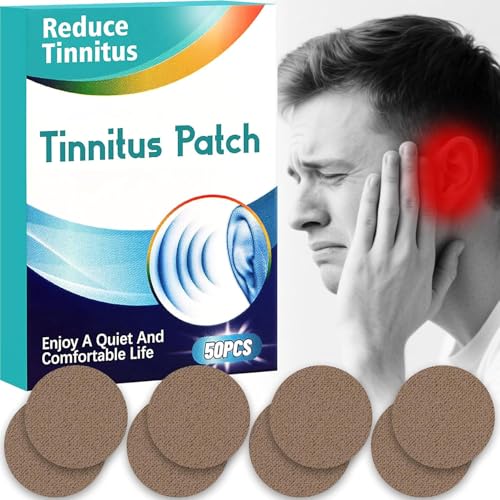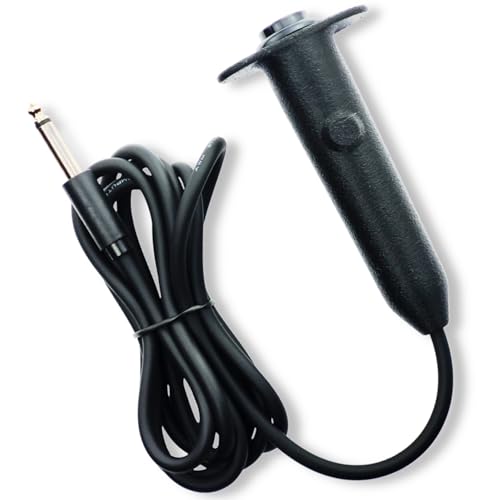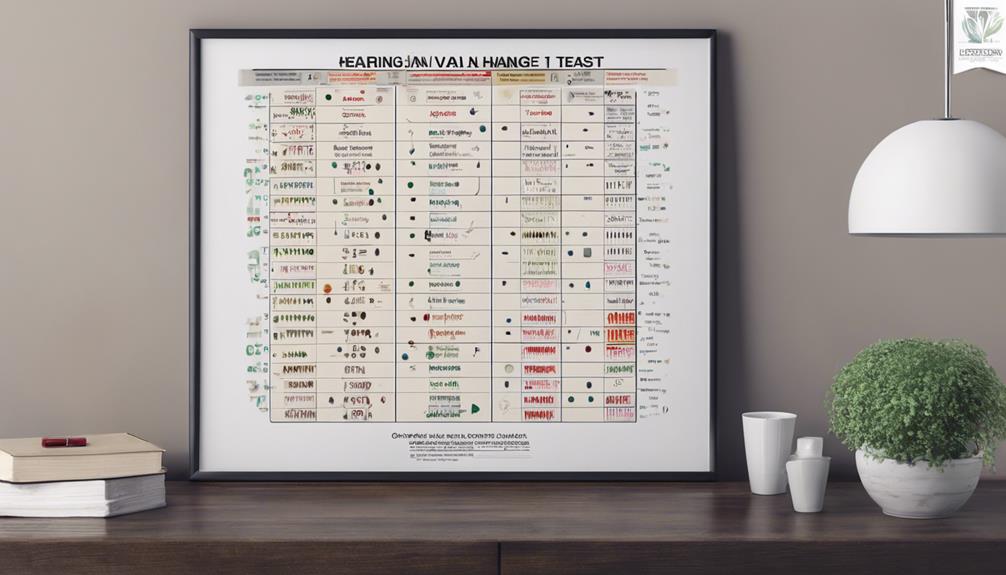Exploring the details of the VA Hearing Loss and Tinnitus Questionnaire, it is evident that the process can be daunting for many veterans.
The initial steps in completing the questionnaire are crucial, but what lies beyond that first page can often be overwhelming.
Understanding the nuances of each section and how it directly impacts your disability claim is essential.
Let's unravel the layers of this guide and explore how it can help navigate the intricate terrain of VA benefits for hearing-related conditions.
Key Takeaways
- Detailed completion aids accurate diagnosis and evidence.
- Essential for disability claims and access to resources.
- Effective communication enhances support for claims.
- Advocacy for policy changes and increased awareness.

Tinnitus Relief for Ringing Ears, Tinnitus Relief Patches, Effective Tinnitus Treatment can Reduce Tinnitus, Relieve Hearing Loss, and Improve Ear discomfort, 50PCS, D
Best Tinnitus Relief: Tinnitus relief patches can help you effectively reduce tinnitus and say goodbye to the inexplicable…
As an affiliate, we earn on qualifying purchases.
As an affiliate, we earn on qualifying purchases.
Understanding the VA Questionnaire Purpose
In assessing claims for disability benefits related to hearing loss and tinnitus, understanding the purpose of the VA Questionnaire is essential for providing comprehensive and accurate medical information.
The Department of Veterans Affairs (VA) designed this questionnaire to gather crucial data regarding the health conditions of hearing loss and tinnitus. Health care providers utilize this tool to document the diagnosis, symptoms, and the impact of these conditions on daily life, aiding in the evaluation process for disability benefits.
By accurately completing the VA Questionnaire, individuals can ensure that their medical evidence is well-documented, facilitating a more thorough assessment of their hearing impairments and tinnitus severity. The information provided in the questionnaire serves as a critical foundation for determining the eligibility of individuals for disability benefits associated with hearing loss and tinnitus.
Therefore, understanding and effectively responding to the questions within the VA Questionnaire is paramount in supporting disability claims and advocating for the necessary assistance and resources.

ELEHEAR-Beyond OTC Hearing Aids, AI Powered Speech Enhancement and Tinnitus Masking, Superior Sound Quality, Connectivity with iOS or Android Devices via Bluetooth 5.3, for Seniors and Adults
Super Clear Sound – Powered by VocClear AI Technology with maximum gain of up to 50 dB and…
As an affiliate, we earn on qualifying purchases.
As an affiliate, we earn on qualifying purchases.
Filling Out the Questionnaire Accurately

To ensure a comprehensive and accurate representation of your hearing loss and tinnitus conditions, meticulous completion of all sections in the VA Hearing Loss and Tinnitus Questionnaire is paramount. When filling out the questionnaire, consider the following:
- Provide detailed information about the onset and progression of hearing loss or tinnitus.
- Include specific dates, events, or circumstances related to the development of hearing issues.
- Describe the impact of hearing loss or tinnitus on daily activities and quality of life.
- Be thorough and honest when documenting symptoms and their effects on communication and social interactions.
- Mention any exposure to loud noises during military service that may have contributed to your hearing issues.
Accurately documenting your hearing and tinnitus experiences in the questionnaire is crucial for the Department of Veterans Affairs to conduct a proper Disability Evaluation.

Audiometer Patient Response Button for Hearing Tests | Audiologist-Trusted Audiometry Switch | Rated 500,000+ Clicks | Universal 1/4" Plug | Magnetic for Sound Booths
Designed by a hearing professional for real-world clinical use.
As an affiliate, we earn on qualifying purchases.
As an affiliate, we earn on qualifying purchases.
Tips for Communicating Symptoms Effectively
When effectively communicating symptoms of tinnitus and hearing loss, it is essential to articulate the specific type, frequency, and intensity of the experienced symptoms. Mention any triggers or patterns that worsen or alleviate your symptoms, and provide information on how long you have been experiencing them and any changes over time. Be specific about associated symptoms such as dizziness, pain, or changes in hearing clarity, and detail how these symptoms impact your daily activities, work responsibilities, or overall quality of life.
| Category | Details |
|---|---|
| Hearing Impairment | Specify type (e.g., sensorineural, conductive), frequency, and intensity |
| Tinnitus symptoms | Describe sounds heard, frequency, intensity, and any patterns observed |
| Triggers | Identify factors that worsen or alleviate symptoms |
| Associated symptoms | Detail any dizziness, pain, or changes in hearing clarity |
| Impact on daily activities | Explain how symptoms affect work, communication, and quality of life |
Effective communication is key to ensuring accurate diagnosis and appropriate support for hearing impairment and tinnitus. By providing clear and detailed information, you empower healthcare professionals to better understand your condition and tailor their treatment plans to meet your specific needs.

ProCase Noise Reduction Ear Muffs, Sound Proof Ear Protection, NRR 28dB Noise Cancelling Headphones for Adults Kids Autism, Hearing Protection for Shooting Gun Range Mowing -Red
Constructed by solid ABS shell and thickened foam, the ear muffs achieve NRR 28 dB (SNR 34 dB)…
As an affiliate, we earn on qualifying purchases.
As an affiliate, we earn on qualifying purchases.
Importance of Advocating for Support

Efficient advocacy for support in the realm of hearing impairment and tinnitus is crucial for ensuring expedited access to essential healthcare services. Advocating for individuals with hearing loss and tinnitus can have a significant impact on their quality of life and treatment outcomes. By raising awareness about the challenges faced by those with these conditions, advocacy efforts can lead to policy changes and increased funding for research and programs related to hearing impairments. Supporting advocacy organizations is essential for amplifying the voices of individuals affected by hearing loss and tinnitus.
Through advocacy, individuals can also advocate for disability compensation through the VA Form and access resources available through Vermont Avenue. In advocating for support, one can shed light on the functional effects of hearing loss and tinnitus on veterans and push for necessary changes in the system to ensure better care and understanding.
- Raise awareness about challenges faced by individuals with hearing impairments
- Influence policy changes related to disability compensation
- Advocate for increased funding for research on hearing loss and tinnitus
- Support advocacy organizations amplifying voices of affected individuals
- Push for improved access to necessary healthcare services.
Resources for VA Hearing Loss and Tinnitus
Advocating for individuals with hearing loss and tinnitus highlights the crucial need for accessible and comprehensive resources within the VA system to address their specific healthcare needs effectively. The Department of Defense and VA health system play pivotal roles in providing support to service members and Veterans experiencing hearing-related issues. It is essential to ensure that resources are readily available for screening, diagnosis, and treatment of conditions such as hearing loss, tinnitus, PTSD, and Traumatic Brain Injury (TBI). By offering specialized services like cochlear implant care and tailored treatment plans for those with sensory impairments, the VA can significantly enhance the quality of life for those affected. To illustrate the importance of these resources, the table below outlines key areas where the VA can further support individuals with hearing loss and tinnitus:
| Resource Type | Importance |
|---|---|
| Diagnostic Services | Early detection crucial for treatment |
| Rehabilitation | Comprehensive care for better outcomes |
| Mental Health Support | Addressing PTSD and its impact |
Frequently Asked Questions
What Do You Say at a VA Tinnitus Exam?
At a VA tinnitus exam, it is important to share the severity, frequency, and impact of tinnitus symptoms on daily life.
Details about treatments tried for managing tinnitus should be included, along with any triggers or worsening factors that may be relevant.
Describing changes in hearing, sensitivity, and associated symptoms is crucial for a comprehensive evaluation.
Honesty and detail about emotional and mental health effects are essential for proper assessment and support during the exam.
What Percentage of VA Disability Is Tinnitus and Hearing Loss?
We rate Tinnitus at 10% and Hearing Loss from 0% to 100%, averaging 10%.
Tinnitus claims are most common, followed by Hearing Loss.
Both are evaluated separately for disability percentages by the VA.
Anticipated changes in Tinnitus criteria could affect overall disability ratings.
What Not to Say at C&P Exam?
When attending a C&P exam, we should be cautious about exaggerating or downplaying symptoms of hearing loss or tinnitus. It's essential to provide consistent and accurate information, disclosing details about the onset, frequency, and severity of our conditions.
Avoid making assumptions about the examiner's knowledge or intentions, and stick to discussing only relevant medical issues. It's crucial to be honest and transparent during the evaluation process for a fair assessment.
Is It Hard to Get VA Disability for Hearing Loss?
Getting VA disability for hearing loss can be challenging due to the complex evaluation process. Factors like puretone thresholds and speech discrimination play a significant role in determining the rating.
Have you ever wondered how these factors impact your claim? Understanding the criteria and providing thorough documentation can improve your chances of receiving compensation.
It's essential to navigate this process with precision and detail to ensure your claim is successful.
Conclusion
In conclusion, completing the VA Hearing Loss and Tinnitus Questionnaire accurately is crucial for veterans seeking disability benefits. It's essential to advocate for support and communicate symptoms effectively to ensure a fair assessment.
According to recent data, approximately 60% of veterans who served in Iraq and Afghanistan have reported hearing loss or tinnitus. By utilizing resources and following the guidelines provided in the questionnaire, veterans can navigate the process successfully and access the necessary support for their hearing-related issues.










